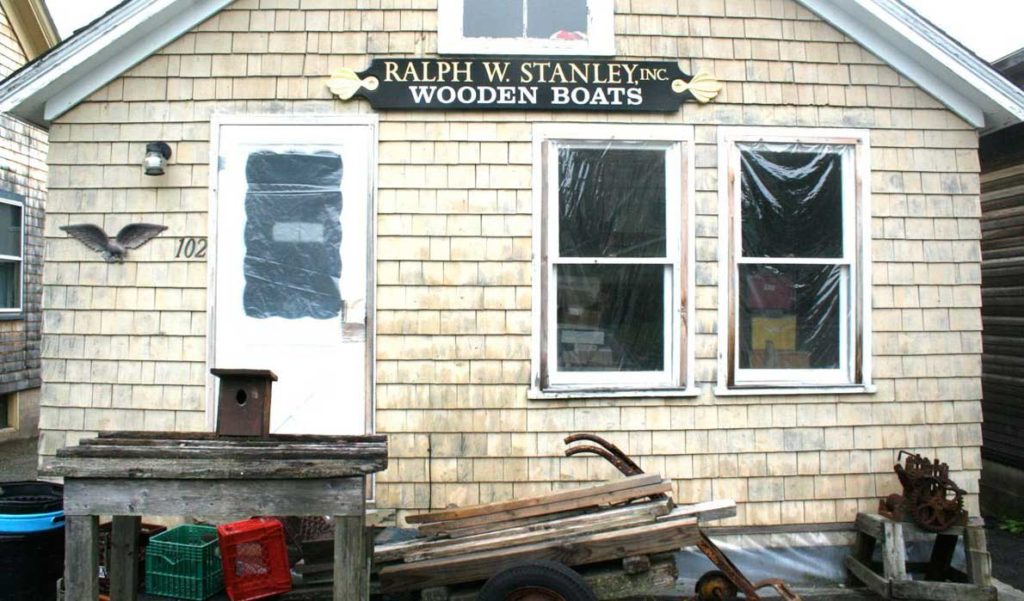SOUTHWEST HARBOR—When wooden boatbuilder Ralph Stanley retired five or six years ago, he was hoping to see his shop converted into a living museum with a teaching component, with Stanley as artist-in-residence. Despite interest from a number of organizations and individuals, the potential cost of endowing and operating such an enterprise has so far proved insurmountable.
Stanley recently dropped the price of the property substantially, from $890,000 to $750,000, in hopes of attracting a buyer.
Stanley is an elder statesman in the wooden boatbuilding industry, a National Heritage Fellow and Boatbuilder Laureate of Maine. Now in his 80s, he devotes his time to fiddle-making, playing music, genealogical research and writing. The home he owns with his wife, Marion, is adjacent to the shop.
“I want to hang on as long as I can,” he said recently. “I’d like to sell the property to someone who’d let me live here.”
Stanley began building wooden boats in 1946, in a small shop where his grandfather once specialized in fancy pinstripes and gold-leaf lettering on horse-drawn carriages. He later inherited a house built in 1926 by his great-uncle. In the 1970s, next to the house, he built the present-day shop, a solid, cavernous structure. Overall, Stanley has built more than 70 wooden boats, primarily lobster boats, Friendship sloops, lobster yachts, dories and rowboats. He also restored a large number of wooden boats.
In 2009, Stanley’s son Richard, since 1983 an integral part of the business, inched the company’s final project down the ways. The 40-foot Friendship sloop Westwind, built in 1902 by Charles Morse, was the last boat to see the inside of the shop. Richard went on to found Richard Stanley Custom Boats, in nearby Bass Harbor.
In the meantime, the agents handling the property, Anne Welles and David Dodge, with Margot H. Stanley Real Estate, were trying to find a way to fulfill Stanley’s dream.
“There’s been interest,” said Welles.
Early in 2014, Maine Coast Heritage Trust facilitated a discussion with possible stakeholders—including academics, boating interests, local historical societies, and artisans—for individual or shared uses. Welles also contacted the National Park Service, several philanthropists, and others who might be interested in investing in waterfront access.
“There were many people—anybody who had an interest in maintaining it as working waterfront or maybe providing public access,” Welles said. “But to do something like that would have to be a cooperative effort, and that was a challenge. So we’ve remained in contact with them and they’d love to see something happen, but they felt it wasn’t a property they themselves could spearhead.”
The shop could continue with boatbuilding. But modern boat-transportation options make it possible for builders to avoid high shoreline property purchase costs and yearly taxes by working inland.
“When I came here, the tax was $600 a year,” said Stanley. “Times have changed. Now it’s about $11,000.”
The property, just over one-third of an acre overlooking the harbor, consists of a 1,500-square-foot building where Stanley built his boats, a 1,890-square-foot storage building, a 900-square-foot utility building, an office and design studio, a large, solid wharf, two wooden marine railways, floating dock, and the house, a New England cape.
Located in the town’s maritime activity zone, there’s some flexibility in how the property can be used. According to Southwest Harbor’s land use ordinance, maritime activities include anything to do with boats, such as boatbuilding, sail lofts, brokerages, marinas, storage, charters and excursions, and retail of boat-related equipment and parts, as well as activities related to fishing, waterborne shipment and other maritime activities.
Depending on the zone’s 75-foot setback requirement from the high-water line, it might be possible to convert a portion of the commercial buildings into a second residence, said Southwest Harbor Town Manager and Code Enforcement Officer Donald Lagrange.
“The town will provide all the assistance it can to any potential buyer of that property,” he said.
For more information, visit ralphstanleywoodenboats.com.





